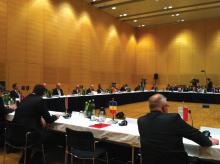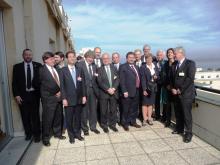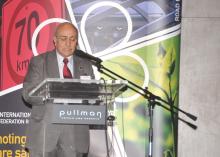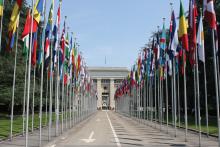The culmination of extensive deliberation and work over the past few years by IRF Geneva’s Policy Committee on Intelligent Transport Systems (ITS), The IRF Vienna Manifesto on ITS – Smart Transport Policies for Sustainable Mobility will be the object of a high-profile launch during the forthcoming 19th ITS World Congress, to be held in the Austrian capital from 22-26 October 2012. The Manifesto brings together key policy arguments for investing in ITS as well as a set of supporting policy recommendations.
RSS
The Manifesto has been compiled by committed transport industry professionals anxious to address, through the IRF Policy Committee, a perceived lack of awareness among political leaders and key decision makers regarding the major contribution ITS could make towards achieving vital transport policy objectives. The Manifesto will be of key relevance to politicians at the local, national, state and regional levels, as well as to senior officials and their advisors within the various transport authorities.
In this context, the Manifesto highlights that the planning, deployment and operation of ITS has to be ‘people-focused’ and ‘solution-driven’. The brief is not about technology being the right answer merely because it is ‘modern’. Rather, the Manifesto addresses policy recommendations designed to enable the optimum use of smart technologies towards achieving the fundamental global transport objectives of safety, sustainability and efficiency.
The key findings and recommendations of the Manifesto are rigorously evidence-based and flow from a comprehensive set of meetings initiated by the1201 IRF Geneva Policy Committee since its inception in 2008. In this respect, the Policy Committee offers participants a truly global platform for high-level knowledge exchange on an exhaustive range of ITS themes and priorities. Its members, currently numbering some 70 experts drawn from all over the world, focus on deliverables aimed not only at convincing political leaders and policy makers about the value and future potential of ITS, but also at actively assisting governments and stakeholders in setting up effective and sound ITS strategies. If you would like to find out more, or get involved in the work of the Policy Committee, contact IRF Geneva’s Road Finance and ITS expert, Caroline Visser, through [email protected].
Copies of the IRF Vienna Manifesto on ITS will be available for download from the IRF Geneva website (www.irfnet.ch) from October 2012.
The culmination of extensive deliberation and work over the past few years by IRF Geneva’s Policy Committee on Intelligent Transport Systems (ITS), The IRF Vienna Manifesto on ITS – Smart Transport Policies for Sustainable Mobility will be the object of a high-profile launch during the forthcoming 19th
The Manifesto has been compiled by committed transport industry professionals anxious to address, through the IRF Policy Committee, a perceived lack of awareness among political leaders and key decision makers regarding the major contribution ITS could make towards achieving vital transport policy objectives. The Manifesto will be of key relevance to politicians at the local, national, state and regional levels, as well as to senior officials and their advisors within the various transport authorities.
In this context, the Manifesto highlights that the planning, deployment and operation of ITS has to be ‘people-focused’ and ‘solution-driven’. The brief is not about technology being the right answer merely because it is ‘modern’. Rather, the Manifesto addresses policy recommendations designed to enable the optimum use of smart technologies towards achieving the fundamental global transport objectives of safety, sustainability and efficiency.
The key findings and recommendations of the Manifesto are rigorously evidence-based and flow from a comprehensive set of meetings initiated by the
Copies of the IRF Vienna Manifesto on ITS will be available for download from the IRF Geneva website (www.irfnet.ch) from October 2012.









